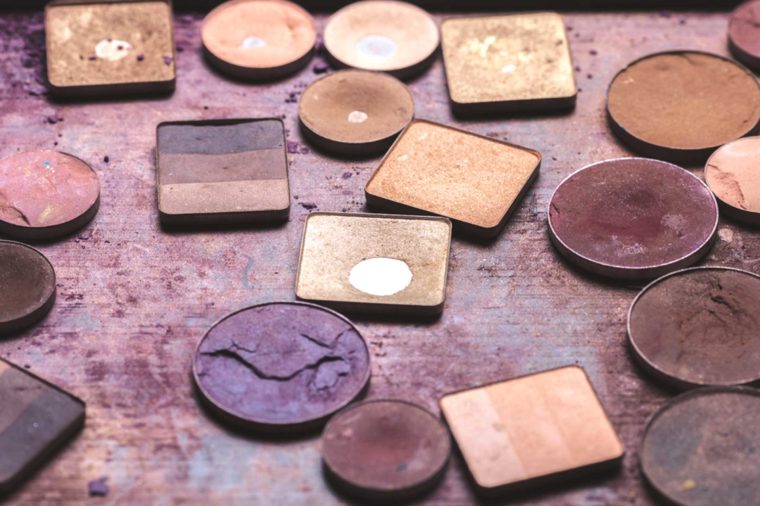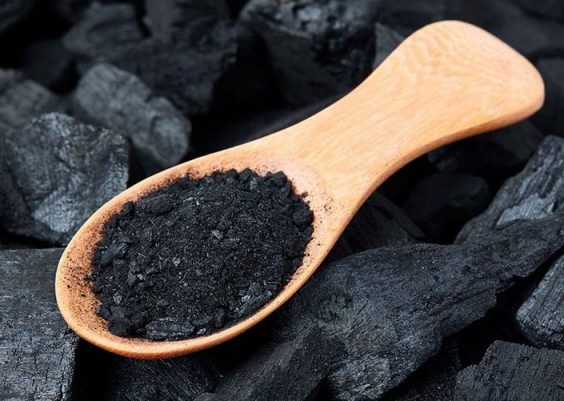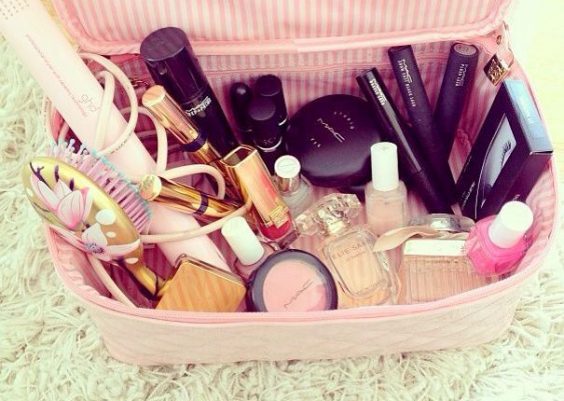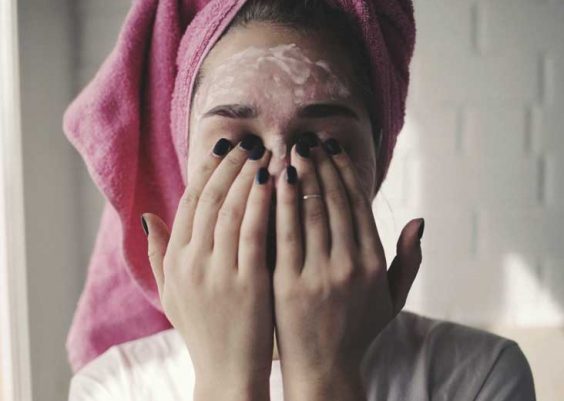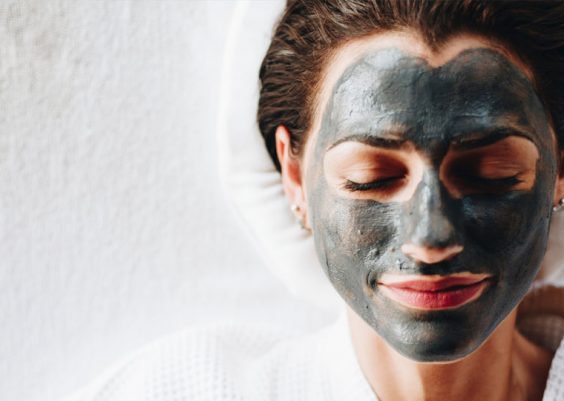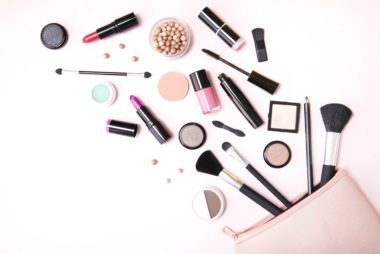
Take a gander into any woman’s makeup bag, and we can guarantee you’ll discover a cringeworthy hoard of years-old makeup. Whether we bought it because we didn’t know how to say no to the intimidating lady at the makeup desk or because we got a bit too spend-happy with our paychecks, chances are you have several foundation bottles or primer potions you’ve only pumped once (not to mention the Naked Palette that you’ve only used two shades out of). Beyond the blatant signs of expiration—dried mascara and crumbling eyeshadow— it can be tough to tell when makeup has met its end. Surprisingly, U.S. labeling regulations don’t mandate an expiration date on most cosmetics, making it that much trickier to determine its lifespan. Regardless of whether they’re brand new or on their last life, beauty products do go bad. Even worse—they can cause breakouts, skin parasites, infections, and loss of vision if not disposed of at the proper time.
While it may be difficult to toss away our precious samples, old makeup can serve as a breeding ground for germs, harboring nasty bacteria that can incur some serious damage. But before you start embarking on an extensive makeup cleanse, we decided to ask the experts to give us the real facts. We turned to Jessica Mae, founder, creative director, and makeup artist of WarPaint International Beauty Agency, and Kelli J. Bartlett, GLAMSQUAD’s Director of Makeup Artistry, for advice on when to dump our old cosmetics—and just how bad it is to use them past their elusive lifespan.
Yes, makeup DOES expire.
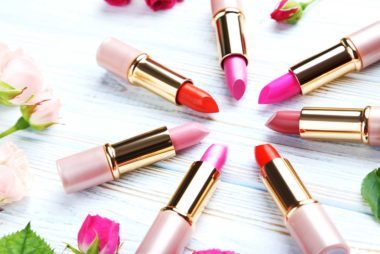 Liquid foundation generally lasts for 12 months, while mascara and eyeliner only stretch for three. Lip products will generally go for around two years, but can begin deteriorating earlier if used frequently (and God forbid, shared). Compacts/eyeshadows, since they are “solids,” will generally last for two years or more if stored properly, but be aware that effectiveness and pigmentation will fade over time.
Liquid foundation generally lasts for 12 months, while mascara and eyeliner only stretch for three. Lip products will generally go for around two years, but can begin deteriorating earlier if used frequently (and God forbid, shared). Compacts/eyeshadows, since they are “solids,” will generally last for two years or more if stored properly, but be aware that effectiveness and pigmentation will fade over time.
The older cosmetics get, the less they work.
 As makeup gets older, the ingredients in your makeup will begin to corrode and oxidize, altering the effectiveness of the product. According to Jessica, the chemical ‘makeup’ (no pun intended) of the product starts to break down. “In foundation specifically, this can cause the product to not lay evenly on the skin. Longevity of the application is also affected. The other thing that starts to happen is the preservative starts to break down, therefore allowing bacteria to form.”
As makeup gets older, the ingredients in your makeup will begin to corrode and oxidize, altering the effectiveness of the product. According to Jessica, the chemical ‘makeup’ (no pun intended) of the product starts to break down. “In foundation specifically, this can cause the product to not lay evenly on the skin. Longevity of the application is also affected. The other thing that starts to happen is the preservative starts to break down, therefore allowing bacteria to form.”
Content continues below ad
Even unopened makeup can pose a health risk.
 This can be a difficult question as most people tend to associate “unopened” with “fresh.” This may be the case with your jars of cornstarch, but unfortunately the same does not apply to your favorite cosmetics. Jessica says, “The process will happen more slowly, but once the product is exposed to air the same expiration effects take place. It is also possible that the preservatives start to break down even before you open it. So, if you stocked up on foundation and it’s now been sitting unopened in your drawer for five years, chances are you should just throw it out even though it’s unopened.”
This can be a difficult question as most people tend to associate “unopened” with “fresh.” This may be the case with your jars of cornstarch, but unfortunately the same does not apply to your favorite cosmetics. Jessica says, “The process will happen more slowly, but once the product is exposed to air the same expiration effects take place. It is also possible that the preservatives start to break down even before you open it. So, if you stocked up on foundation and it’s now been sitting unopened in your drawer for five years, chances are you should just throw it out even though it’s unopened.”
Some makeup products are at more risk than others. Kelli says, “For mascara, cream, gel and even powders, it’s super important to note how long you can use a product after opening because the minute air is exposed to the product, it is at risk for contamination.”
Repeated use of expired makeup (especially foundation and eyeliners) can cause infection.
 For one, you aggravate the chances of bacterial growth—and in turn breakouts and infections—when you repeatedly immerse your fingers into old liquid foundation. According to Kelli, “Using old eyeliners can irritate the delicate eye area causing it to become puffy, red, and swollen. Expired powders can irritate your skin and cause little red bumps that look like acne.” In order to avoid reinfection, discontinue use of all eye makeup if you have used them with an eye infection, and lip products if you suffered a nasty bout of cold sores.
For one, you aggravate the chances of bacterial growth—and in turn breakouts and infections—when you repeatedly immerse your fingers into old liquid foundation. According to Kelli, “Using old eyeliners can irritate the delicate eye area causing it to become puffy, red, and swollen. Expired powders can irritate your skin and cause little red bumps that look like acne.” In order to avoid reinfection, discontinue use of all eye makeup if you have used them with an eye infection, and lip products if you suffered a nasty bout of cold sores.
Skin and eyes are most prone to infection, so products applied to those areas must be heeded with care. Jessica adds, “Foundation and mascara are the two non-negotiables in my book. Meaning, don’t ignore the expiration. Both of these products, when opened, get exposed to air, therefore allowing bacteria to enter the container. Over time, as the makeup gets ‘older,’ more and more bacteria and air are introduced.” Bacterial, yeast, or viral contamination can lead to cold sores and impetigo on the lips. Old mascara is prone to the same effects; eyelashes naturally have bacteria on them too, so your mascara wand will be contaminated as soon as you use it. Heavy formulations can block glands along the lash line, opening yourself up to the risk of styes, conjunctivitis, pink eye, and in rare cases, vision-threatening conditions. Moreover, eyeliner tubes are generally very moist, creating the ultimate breeding home for bacteria. In other words, it’s not pretty. Despite cosmetics preservatives, bacteria will inevitably win over.
Cleaning old makeup won’t always revive it.
![]() Luckily, not all is lost for your drawers of old makeup; there is hope in the rescuing prowess of alcohol. Kelli advises sanitizing used lipsticks by dunking them in alcohol and shaving off the top layer. Jessica agrees, “There are different theories out there about revival, but I on the other hand don’t feel there is a way to revive a product once it starts to go bad. Cleaning your makeup is definitely a possibility though. Use 70% rubbing alcohol to spray down your eyeshadows and powder products. This will sanitize the product and prevent bacteria from forming in the first place. Also, keeping your brushes clean will prevent introducing additional oils and bacteria to the product.” As a general rule of thumb, make sure to wash your makeup brushes at least once per week to avoid the throngs of bacteria resting in those synthetic fibers. (Find out how to effectively sanitize your beauty tools).
Luckily, not all is lost for your drawers of old makeup; there is hope in the rescuing prowess of alcohol. Kelli advises sanitizing used lipsticks by dunking them in alcohol and shaving off the top layer. Jessica agrees, “There are different theories out there about revival, but I on the other hand don’t feel there is a way to revive a product once it starts to go bad. Cleaning your makeup is definitely a possibility though. Use 70% rubbing alcohol to spray down your eyeshadows and powder products. This will sanitize the product and prevent bacteria from forming in the first place. Also, keeping your brushes clean will prevent introducing additional oils and bacteria to the product.” As a general rule of thumb, make sure to wash your makeup brushes at least once per week to avoid the throngs of bacteria resting in those synthetic fibers. (Find out how to effectively sanitize your beauty tools).
Content continues below ad
Makeup stored in the bathroom is especially risky.
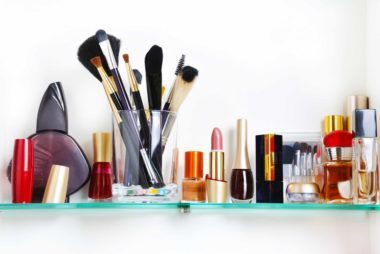 In order to prolong your makeup’s shelf life, proper makeup storage is key. Although it may make sense to keep our cosmetics in the bathroom, storing products there may not always the best idea. Humid steam from showers can breed mold, especially in products that have surpassed its use-by date. Kelli warns, “If you keep your makeup in a warm or steamy place like your bathroom, I suggest a shorter shelf life.”
In order to prolong your makeup’s shelf life, proper makeup storage is key. Although it may make sense to keep our cosmetics in the bathroom, storing products there may not always the best idea. Humid steam from showers can breed mold, especially in products that have surpassed its use-by date. Kelli warns, “If you keep your makeup in a warm or steamy place like your bathroom, I suggest a shorter shelf life.”
Bottom line: When in doubt, throw it out.
 So when exactly is your cue to clean out your makeup bag? The general lifespan rules mentioned earlier are a good rule of thumb, but everything ultimately spirals down to good judgment. If your cosmetics are starting to smell funky, nix them. If your liquids are starting to turn a different color, discard them. And if your mascara consistency is starting to resemble that of dry raisins, discard it. According to Jessica, “If the product starts to dry out, it’s definitely time to replace it. In foundation, watch for if the product is separating in the container. For lipstick/gloss, if the color starts to change tone or you notice a change in the way it smells.” Kelli adds, “When it comes to mascara, try the smell test. You can really tell when it’s gone bad because you’ll notice a hint of something funky in the smell. You’ll probably also be able to tell by the way the mascara goes onto your eyelashes. If it starts flaking or just doesn’t last throughout the day, it’s another sign you need a new tube. For blush and bronzers in both creams and powders, you’ll notice a kind of a film on the top to indicate they’ve expired.”
So when exactly is your cue to clean out your makeup bag? The general lifespan rules mentioned earlier are a good rule of thumb, but everything ultimately spirals down to good judgment. If your cosmetics are starting to smell funky, nix them. If your liquids are starting to turn a different color, discard them. And if your mascara consistency is starting to resemble that of dry raisins, discard it. According to Jessica, “If the product starts to dry out, it’s definitely time to replace it. In foundation, watch for if the product is separating in the container. For lipstick/gloss, if the color starts to change tone or you notice a change in the way it smells.” Kelli adds, “When it comes to mascara, try the smell test. You can really tell when it’s gone bad because you’ll notice a hint of something funky in the smell. You’ll probably also be able to tell by the way the mascara goes onto your eyelashes. If it starts flaking or just doesn’t last throughout the day, it’s another sign you need a new tube. For blush and bronzers in both creams and powders, you’ll notice a kind of a film on the top to indicate they’ve expired.”
Content continues below ad

